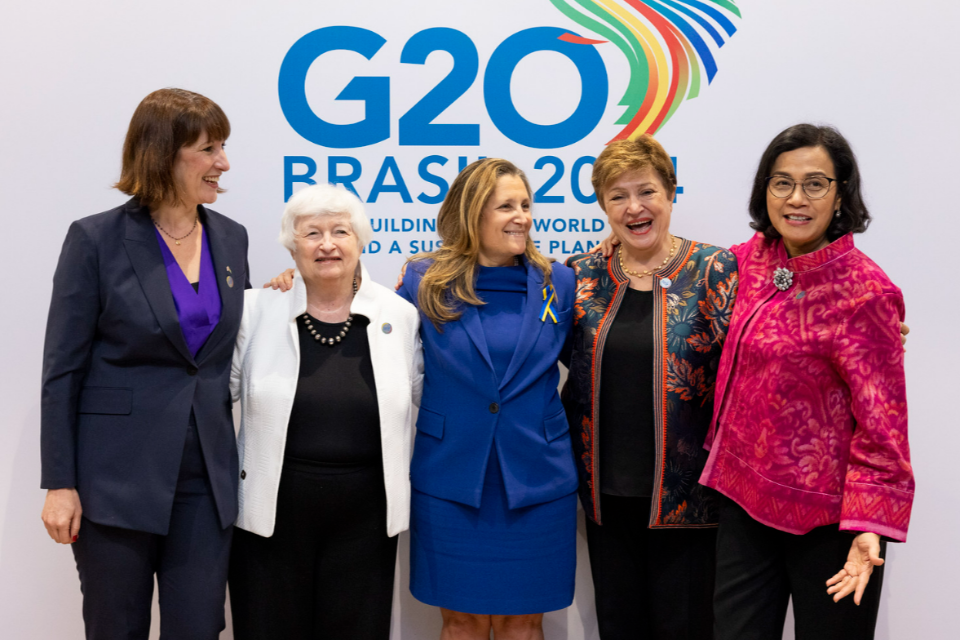Britain back open for business, Chancellor to tell G20

- Reeves to bang the drum for British business on first international visit since taking office
- First female Chancellor to champion the importance of female leadership in economics and finance
Chancellor of the Exchequer Rachel Reeves will today arrive in Rio de Janeiro, Brazil, to attend the G20 Finance Ministers and Central Bank Governors Meeting on her first international visit since taking office.
The Chancellor will meet with G20 counterparts for the first time, where she will champion British business and declare the country is ‘open for business’ once again after years of uncertainty and instability.
The Chancellor will tell an international audience that the number one priority of the new British government is to deliver economic growth to make every part of the country better off. She will urge business leaders to “take another look at Britain” as she talks to the Government’s plans to boost international investment.
She will outline to leaders of world economies how she will always act in the national interest on major international issues, including climate change and support for Ukraine as Russia’s illegal invasion continues into its third year. The Prime Minister has already recommitted £3 billion per year of military support to the end of the decade or for as long as needed.
Rachel Reeves, Chancellor of the Exchequer, said:
Over the coming days my message to international leaders is simple: after years of uncertainty and instability, Britain is open for business once again.
This new government’s number one mission is to boost economic growth so we can make every part of the country better off. That can only happen by working alongside business from around the world to encourage them to invest in the jobs and industries of the future.
That is why over the coming two days I will be banging the drum for British business and urging leaders to take another look at us.
I’m ready to take my seat at the table alongside fellow finance ministers, steering the world economy and representing our national interests on the major issues of our time, including grasping the growth opportunities of the net zero transition and putting pressure on Russia to end the war in Ukraine.
Chancellor Reeves will also use her platform as the UK’s first woman Chancellor to champion the importance of female leadership in economics and finance, as she meets with other female leaders while at the G20.
Chancellor Reeves’ visit to Brazil is the latest step in the government’s national mission to grow the economy. Since taking office, she has pursued reform of the economy to fix its foundations and make every part of Britain better off, including announcing changes to the planning system, ending the ban on new onshore wind and launching a National Wealth Fund to catalyse private sector investment.
Brazil holds the presidency for the G20 this year, with a focus on social inclusion and the fight against hunger; energy transition and sustainable development; and reform of global governance. Ministers and governors will discuss the global economy, financial stability, international taxation, climate, and debt and development. The Chancellor will promote collaboration on issues including addressing inequality, driving growth and progressive taxation.
The UK and Brazil’s relationship is particularly strong in green finance, with Brazil raising $2 billion by listing its new sustainable sovereign bond on the London Stock Exchange. The UK government recently renewed its Memorandum of Understanding with the Brazilian Development Bank on cooperation on the green transition, in particular on green finance. Britain has also made £5 billion available in UK Export Finance funding to meet Brazil’s needs.
Related
Why investing in women is a vital next step for…
Get Nadine White's Race Report newsletter for a fresh perspective on the week's newsGet our free newsletter from The Independent's Race CorrespondentGet our fre
Business secretary signals major shift on electric car policy to…
In a determined effort to retain Nissan’s manufacturing presence in Britain, Business Secretary Jonathan Reynolds has vowed to implement “substantial c
Joint Statement: Business Secretary and Fujitsu Services Ltd
Business and Trade Secretary Jonathan Reynolds today (Friday 7 March) met chiefs for Fujitsu in Tokyo to begin talks over the cost of redress for victims of th
UK foreign secretary backs multilateral defence funding for Europe
UK foreign secretary David Lammy has said that a new multilateral fund will be needed to secure Europe’s defence as he confirmed that Britain is “open to”













